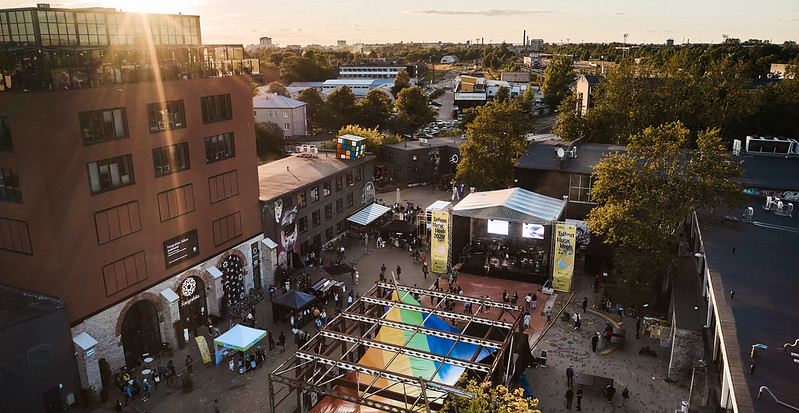Tallinn Music Week and Station Narva festivals brought 1617 overnight stays by foreign tourists to Estonia during the coronavirus period

Music and city culture festivals Tallinn Music Week and Station Narva, which took place on 26 – 30 August, boosted international and regional tourism during the post-lockdown coronavirus period. The two festivals combined brought 1671 overnight stays to the local hotels. More than 170 articles and reports in the international media brought positive news about Estonia and the region’s music to almost 900,000 readers around the world.
Impact on the Estonian economy and tourism
TMW and Station Narva boosted both domestic and foreign tourism as well as the entire cultural sector ecosystem. A total of 658 foreign visitors who attended the festivals, spent an average of 2.46 nights in Estonian hotels. According to an impact survey carried out by the Estonian Institute of Economic Research in 2018, TMW’s foreign visitors spent an average of 434.30 euros in Estonia during their visit, which brings the total to 290 000 euro contribution to the Estonian economy. The festival offered work and income opportunities for 160 companies in Tallinn and 59 companies in Narva.
According to Statistics Estonia, 67% fewer foreign tourists were accommodated overnight in Estonia compared to last year. Although in comparison with TMW’s initial projections, the travel restrictions brought 39% fewer foreign visitors to the festival, then compared to the overall national statistics, TMW did succeed in retaining more foreign visits.
TMW’s partners in the tourism sector highly appreciated the festival’s contribution towards enlivening tourism and supporting the marketing of Estonia as a destination in the post-emergency situation conditions.
According to Tiit Pruuli, president of the Estonian Travel and Tourism Association (ETFL) and board member of Go Group, people needed a good reason to travel this past summer, however, they also needed professional services and calm, precise communication. “I applaud Tallinn Music Week and other cultural events organisers, who collaborate with the tourism sector, for the extra effort that receiving guests from abroad requires during these times,” Pruuli commented, adding that “Tourism and culture are phenomena that support each other. It is also very clear that cultural events organised in these complicated times have helped the tourism sector. ETFL supports responsible travel and events also during the pandemic.”
Feliks Mägus, board member of Nordic Hotels, also highlights TMW’s contribution to promoting foreign travel this year, “We highly commend the determination of Helen Sildna and the whole TMW team for organising the festival despite the very complicated situation. Cultural activity must persist in difficult times as well, and Nordic Hotel Forum is glad that the festival brought foreign guests to Tallinn in a responsible way. We will reopen after renovations next spring, in order to be ready for the season and the next TMW in May. It has been a joy to be a partner to TMW for their entire journey.”
Impact on the music and culture sector
TMW provided work for the whole ecosystem that revolves around the cultural sector, including 160 service providers from live industry suppliers to food service and travel companies.
For the Estonian music sector, first and foremost, the festival provided international promotion and networking options. According to the TMW 2020 Impact Survey, Estonian artists who performed at the festival valued most highly the artist counselling service that was introduced this year, as well as coverage possibilities in international media. Over 170 TMW-related features and reports reached nearly 900 000 people around the world. TMW’s activities and performers were covered in the world’s most widely circulated music monthlies such as MOJO and Rolling Stone, as well as leading international trade press publications such as Pollstar, Audience and IQ, the Finnish national broadcaster YLE TV, and Germany’s Deutsche Welle.
Impact on regional development
The TMW programme also reached outside of major hubs, to the districts of Kopli and Lasnamäe. Taking place in the same week with TMW, the Station Narva festival brought 1167 people to Narva, of whom an estimated two-thirds were from Narva and the surrounding area, and a third from elsewhere in Estonia. Despite the modifications due to changing travel restrictions, the public and the local residents valued highly both the festival programme and the way in which it highlighted the possibilities of Narva’s urban space, as well as the inclusion of marginalised groups.
The next TMW will take place on 6 – 9 May, 2021, and the next Station Narva in September 2021.
TMW and Station Narva are organised by Shiftworks OÜ in cooperation with many partners and co-organisers, in line with the rules applicable to public events, aimed at reducing the spread of the coronavirus.
TMW 2021 passes are on sale at shop.tmw.ee. Until 20 December, the Festival Pass costs 45 euros and the PRO Pass, which gives access to the festival and conference both in person and virtually, 150 euros. Also available are the DigiPRO Pass for 50 euros, which gives digital access to the conference, and the Supporter Pass for 225 euros, which gives an opportunity to both support the festival and to get insight into its organisational process.
Additional information:

